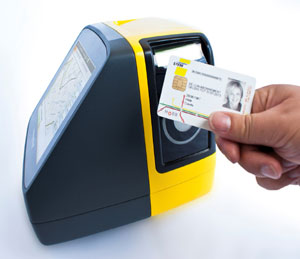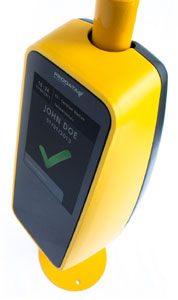Prodata Mobility Systems wins the De Lijn ReTiBo 97-million euro contract
- Like
- Digg
- Del
- Tumblr
- VKontakte
- Buffer
- Love This
- Odnoklassniki
- Meneame
- Blogger
- Amazon
- Yahoo Mail
- Gmail
- AOL
- Newsvine
- HackerNews
- Evernote
- MySpace
- Mail.ru
- Viadeo
- Line
- Comments
- Yummly
- SMS
- Viber
- Telegram
- Subscribe
- Skype
- Facebook Messenger
- Kakao
- LiveJournal
- Yammer
- Edgar
- Fintel
- Mix
- Instapaper
- Copy Link
Posted: 30 August 2011 | Prodata Mobility Systems | No comments yet
Contract is for new validators and on-board computers on all the buses and trams of De Lijn…


Fig. 1: Drivers Console DC800
A consortium centered on Prodata Mobility Systems will, as of next year, equip the busses and the trams of the Belgian transport company De Lijn with an onboard computer and validators for the MOBIB card, the new chip card of the transport company. Flemish Minister of Mobility, Hilde Crevits, is investing 97 million euros in the project. The introduction of the chip card is part of the motor powering De Lijn’s efficient and demand-led supply.


Fig. 1: Drivers Console DC800
The THV Prodata Systems – Prodata Mobility Systems – Fabricom GDF Suez consortium will provide for the installation of the equipment for the MOBIB card in the vehicles of De Lijn, the vending machines, the development of the accompanying software, and the necessary training of the personnel. This involves 4,500 on-board computers, 4,500 touch screens for the drivers, 12,000 contactless validators for the passengers, and 65 vending machines. Good for an investment of 74.9 million euros. In addition, 22.1 million euros will go for the maintenance of the hardware (for 12 years) and the software (for five years).
Flemish Minister Hilde Crevits: “With the introduction of the chip card, we will get to know the movement flows of our passengers better. In this way, De Lijn will be able to tune its supply better and more efficiently to the needs of the passengers. With the MOBIB card, De Lijn is also taking an important step in the introduction of one single transport pass for the four transport networks (De Lijn, MIVB, TEC and NMBS): in the future, the passenger, with the new card, will be able to transfer easily from one network to another. In addition, the on-board computer provides many opportunities to support the driver in his or her job. For example, the on-board computer will automatically compile a daily report and provide much card information.”
Because the passengers have to register when they get on, De Lijn can compile a great deal of managerial information. With it, the transport company will be able to deploy its available vehicles more efficiently: more or larger vehicles where and when the demand is the greatest and also fewer or smaller vehicles where the demand is less. With this, De Lijn can better tune its supply to the needs of the passenger and provide better service to its customers.


Fig.2: Validator V800
The validators for the passengers will have an interactive touch screen: the passenger, for example, will be able to see the balance on his or her card or purchase an event ticket. In time, the new validators will replace the present, yellow Prodata validators, which have been validating cards and tickets since 1993.
By means of the on-board computer with GPS localization, more accurate information will be provided about precisely where and when a vehicle is driving. With this, the passengers will, in time, be able to obtain customized and up-to-the-minute information. In the future, this will also be able to be transmitted via mobile applications.
For the safety of the driver and the passengers, the driver can send an emergency message via the on-board computer. The on-board computer is also an open platform with a Service Oriented Architecture (SOA) that, in the future, will be able to offer even more functions. Thus, the driver will be informed automatically via the intelligent console about, for example, a detour. The route will be displayed on a map. Thus, he or she can easily take a detour. Finally, the on-board computer will play an important role in the introduction of the new, dynamic traffic-light control.
Flemish Minister Hilde Crevits: “The introduction of the chip card is much more than merely a system for ticketing and counting passengers. By this investment in new technology, De Lijn will have the opportunity to enhance its client-orientation and efficiency by means of such things as accurate management information. The introduction of the contactless validation system opens the door to new services that will benefit both the client and the driver. The system also permits the assembly of a large amount of journey data. In this way, De Lijn is and must remain a reliable traveling partner.”
Phased introduction In the beginning of 2012, one bus and two trams will be equipped with a new on-board computer and validator. Starting in September 2012, gradually all of the vehicles will be so equipped: De Lijn will start in Flemish Brabant with the first hundred busses. By the end of 2013, all of its vehicles will have an on-board computer and at least one validator. The old and new validators will co-exist next to each other for two years. By the end of 2014, when all of the passengers will have their chip cards, the old yellow validators will be removed.
Related cities
Belgium
Related organisations
Prodata Mobility Systems



